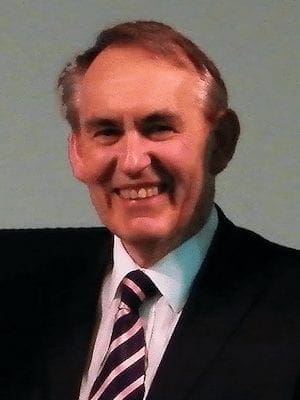President Donald Trump’s views on climate change are concerning.
Reports on his climate-change stance indicate a man who is either easily swayed by the views of others, who does not have a clear appreciation of the issues, or is a very shrewd political operator who seeks popularity where it is most useful to his own interests, both political and in business.
President Trump and people in his administration have questioned human-induced climate change and expressed desire to withdraw from the COP 21 Paris Agreement on climate change and repeal America’s Clean Power Plan.
His “America-first Energy Plan” also aims to reinvigorate the U.S.’s collapsing coal industry. He favors lifting restrictions on fracking and drilling for oil and gas on federal lands.
One of his advisers has expressed the view that NASA should substantially reduce its climate change research and concentrate on space research.
The administration appears to believe that addressing climate change makes U.S. companies less competitive, while environmentalists believe such policy changes will damage worldwide efforts to reduce global warming.
We should pray that the rhetoric of the campaign trail continues to be moderated in the shaping of good government.
As we begin to address these issues biblically and theologically, we might explore the prophecies of Isaiah, as Ed Brown of the Lausanne/WEA Creation Care Network did in a December 2016 circular e-mail.
He asks what creation care might look like in “the Age of Trump?”
Brown reflects on Isaiah 6:1 – “In the year that King Uzziah died,” which for the Kingdom of Judah was the end of a stable 52-year political rule. He questions whether the West is coming to the end of a relatively stable period of 70 years with no world war.
With Brown, we might suggest that this is our starting point: acknowledging that we are part of a broken world running away from God and being prepared to get involved in God’s mission in caring for God’s creation (Isaiah 6:5,8).
Brown observes that Isaiah is being called to obedience, but not to results or success. He is to preach to a people who will not listen, offering healing that will not be accepted, and is to carry on “until the cities lie ruined and without inhabitant, until the houses are left deserted and the fields ruined and ravaged” (Isaiah 6:11).
We may not welcome such a call for Christian discipleship, but this is also our calling.
The Old Testament prophets criticized the people for breaking the covenant through their unjust treatment of the poor and vulnerable, and through their failure to care for the land, as Michael Northcott reminds us in his book, “Ecology and Christian Ethics.”
This is God’s warning given in Isaiah 24:5-6 – the exclusion of the poor and the degradation and exhaustion of the environment are seen as the results of ignoring God’s care of creation and God’s justice expressed in the covenant.
Isaiah regularly presents the alternative covenantal way of life (Isaiah 24:4-12; cf. Isaiah 5:1-7; 19:9; 32:14-20; 41:18-19; 55; 58:13-14), which brings restored relationships between God and humanity, and the earth being restored to fruitfulness and harmony (Isaiah 55:10).
Ultimately, the earth will be full of God’s knowledge and glory (Isaiah 11:9, 6:3) and will be made new (Isaiah 65:17). These are the reverses of the broken relationships brought about by the human rebellion of the Fall (Genesis 3).
Simon Woodman, Free Church Chaplain at King’s College in London and co-minister at Bloomsbury Central Baptist Church, observes in “The Book of Revelation” (2008) that empires that take dominion over the earth frequently engage in ecological violence (see Revelation 16:2-12).
He notes that the environmental judgments of Revelation are not personally targeted punishments aimed at those who deny the lordship of Christ, but rather are images evoking the inevitable end-results of the human capacity for empire and exploitation.
Woodman maintains that the environmental call of Revelation is for the church to discover its vocation as witness to an alternative, non-exploitative expression of humanity, focused around the lordship of the one on the heavenly throne.
This is the tension we face as we work to care for God’s creation in the Trump and post-Brexit age, or in any age for that matter.
The basis for our Christian discipleship is to seek:
- God and recognize that we are self-centered sinners in a broken world.
- To be in tune with God’s wisdom – his ways of covenant, reconciliation, redemption and restoration of the world.
- God’s priorities, as Jesus declared: to love God and neighbor (Matthew 22:37-39);
- To influence neighbors, Christian and other, and politicians in the urgent need to care for creation.
- To be assured that our ultimate hope is always in God.
This is hope beyond chaos and catastrophe. It is a hope that includes accountability and judgment. This is hope in God, who is creator and redeemer, and who will ultimately make all things new (Isaiah 65:17 and Revelation 21:5).
John Weaver is the chairman of the John Ray Initiative (JRI), an educational charity focused on connecting environment, science and Christianity in the United Kingdom. He was principal of South Wales Baptist College until his retirement in 2011 and served as the president of the Baptist Union of Great Britain in 2008-09. A longer version of this article first appeared on the JRI blog and is used with permission.
Vice president of the John Ray Initiative (JRI), an educational charity focused on connecting environment, science and Christianity in the United Kingdom. Weaver was principal of South Wales Baptist College until his retirement in 2011 and served as the president of the Baptist Union of Great Britain in 2008-09.

